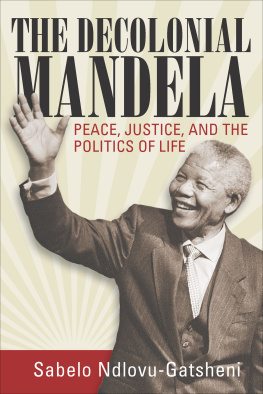Vergès Françoise - A Decolonial Feminism
Here you can read online Vergès Françoise - A Decolonial Feminism full text of the book (entire story) in english for free. Download pdf and epub, get meaning, cover and reviews about this ebook. publisher: Pluto Press, genre: Politics. Description of the work, (preface) as well as reviews are available. Best literature library LitArk.com created for fans of good reading and offers a wide selection of genres:
Romance novel
Science fiction
Adventure
Detective
Science
History
Home and family
Prose
Art
Politics
Computer
Non-fiction
Religion
Business
Children
Humor
Choose a favorite category and find really read worthwhile books. Enjoy immersion in the world of imagination, feel the emotions of the characters or learn something new for yourself, make an fascinating discovery.
- Book:A Decolonial Feminism
- Author:
- Publisher:Pluto Press
- Genre:
- Rating:4 / 5
- Favourites:Add to favourites
- Your mark:
- 80
- 1
- 2
- 3
- 4
- 5
A Decolonial Feminism: summary, description and annotation
We offer to read an annotation, description, summary or preface (depends on what the author of the book "A Decolonial Feminism" wrote himself). If you haven't found the necessary information about the book — write in the comments, we will try to find it.
A Decolonial Feminism — read online for free the complete book (whole text) full work
Below is the text of the book, divided by pages. System saving the place of the last page read, allows you to conveniently read the book "A Decolonial Feminism" online for free, without having to search again every time where you left off. Put a bookmark, and you can go to the page where you finished reading at any time.
Font size:
Interval:
Bookmark:

A Decolonial Feminism
A vibrant and compelling framework for feminism in our times.
Judith Butler
A powerful tool of social transformation.
Djamila Ribeiro, Brazilian human rights activist and author of Nos, Madelenas: uma palavra pelo feminism
Incisive an invitation to reconnect with the utopian power of feminism.
Aurelien Maignant, Fabula
A powerful work.
Les Inrocks
Develops a critical perspective on feminism to reconsider the conditions of possibility and purpose resituates feminism in a truly political, emancipatory and critical dimension.
Jean-Philippe Cazier, Diacritik
Essential for highlighting the current divisions within feminist political agendas, and for collective reflection on a profound, radical transformation of society Necessary reading.
Axelle n219
Franoise Vergs
Translated by
Ashley J. Bohrer with the author

First published 2019 as Un fminisme dcolonial by La Fabrique ditions
English language edition first published 2021 by Pluto Press
345 Archway Road, London N6 5AA
www.plutobooks.com
Copyright La Fabrique ditions 2019; English translation Ashley J. Bohrer 2021
This book has been selected to receive financial assistance from English PENs PEN Translates! programme, supported by Arts Council England. English PEN exists to promote literature and our understanding of it, to uphold writers freedoms around the world, to campaign against the persecution and imprisonment of writers for stating their views, and to promote the friendly co-operation of writers and the free exchange of ideas. www.englishpen.org

The right of Franoise Vergs to be identified as the author of this work has been asserted in accordance with the Copyright, Designs and Patents Act 1988.
British Library Cataloguing in Publication Data
A catalogue record for this book is available from the British Library
ISBN 978 0 7453 4110 1 Hardback
ISBN 978 0 7453 4112 5 Paperback
ISBN 978 1 7868 0641 3 PDF
ISBN 978 1 7868 0642 0 EPUB
ISBN 978 1 7868 0643 7 Kindle
This book is printed on paper suitable for recycling and made from fully managed and sustained forest sources. Logging, pulping and manufacturing processes are expected to conform to the environmental standards of the country of origin.
Typeset by Stanford DTP Services, Northampton, England
Simultaneously printed in the United Kingdom and United States of America
Who cleans the world? was where this book started, and it led to an examination of feminist struggles in the context of a violent and brutal counter-revolution. The question was triggered by a strike of the black and brown women who clean Gare du Nord train station in Paris. It was not the first strike of that kind, nor the first time that we saw the racialization and feminization of underpaid and undervalued cleaning and care work, or that the role of social reproduction in capitalism was discussed. Yet that strike generated a desire to look again at cleaning in the context of #MeToo, Black Lives Matter, the denunciation of police violence and femicides, massive feminist demonstrations and strikes especially in the Global South, but also in the context of feminist racism,
I wanted also to examine the role of what I call in this text, civilizational feminism, which I see as a specific strategy of the current counter-revolution. This feminism borrows the vocabulary and objectives of the colonial civilizing mission, modernizing the policy that Frantz Fanon summarized thus: Lets win over the women and the rest will follow,attacked. Hence, it may come as no surprise that in the attacks on decolonial theory and political antiracism, via petitions, articles or tweets, women of color constitute the majority of persons identified (some with a photograph) as dangerous, with no protest from white feminists.
Since this books original publication in French, we have also learned that the emergence of this global pandemic and its consequences could not be separated from hyper-consumption, mega-farms, industrial waste management, privatization of public health, and the ways in which race, age, class, and gender intertwine to increase precarity and vulnerability. These entanglements mean that decolonial feminism must remain as close as possible to a method that pulls all the threads that simultaneously, yet not in a linear-cause-and-effect way, create wasted lives and wasted lands. Decolonial feminism accepts the existence of other feminisms; it does not wish to become the theory, but to facilitate transborder and international alliances.
This is why the question of Who cleans the world? has remained a central point of analysis in my recent work. Extractivism means the production of waste, of dilapidated lands, rivers, seas and oceans, animals, plants and peoples. It is an economy that leaves behind ruins, ravaged forests, spoiled soil and subsoil, and exhausted bodies left to die. If waste, Fred Magdoff and Chris Williams have argued, is a sign of capitalisms success, The decolonial feminism I defend seeks to bring to light a kaleidoscopic narrative encompassing broad swathes of time and territory and to valorize the unstoppable struggles that challenge the legacies of colonial slavery and racism amid a new age of endless wars. There will be no repairing of what has been made into waste without thinking first by whom and how cleaning will be done. Damage to bodies and lands runs deep, its scars present in souls, in waters and lands. We must hold together past, present and future, but without foreclosing the possibility of a better future.
This text was written from a particular position: from within the current struggle for total liberation, from a long commitment to anti-patriarchal, anti-racist, anti-capitalist and anti-imperialist struggle, and a long engagement with feminist theory and practices in the Global South. By starting with a womens strike, I wanted to show how it remaps social conflict in practice, how it politicizes the precarity of existence as a sequence that is inseparable from dispossession and extraction, and thus constitutes a radical critique of civilizational feminism. By ending with a call for solidarity with those who clean the world, enunciated by a young Dalit, I wished to suggest that the struggle against the racialization of cleaning and caring, while imagining a decolonial politics of cleaning, caring and repairing, shows the way to construct a post-racist, post-capitalist and post-imperialist, thus post-hetero-patriarchal, world.
Franoise Vergs
I want to thank all the brave and courageous women who are fighting for justice, peace and dignity worldwide. Their struggles are a constant source of energy, joy and feminist love. My thanks to all the vibrant, generous and combative, mostly young, women who came to the presentation of my book in 2019 and, with their questions, pushed me to clarify and expand my thinking. Finally, my thanks to translator Ashley Bohrer, to Adam Bell and Charlotte Coombes, to my editor at Pluto David Shulman and to my Paris editor and friend, Stella Magliani-Belkacem.
Font size:
Interval:
Bookmark:
Similar books «A Decolonial Feminism»
Look at similar books to A Decolonial Feminism. We have selected literature similar in name and meaning in the hope of providing readers with more options to find new, interesting, not yet read works.
Discussion, reviews of the book A Decolonial Feminism and just readers' own opinions. Leave your comments, write what you think about the work, its meaning or the main characters. Specify what exactly you liked and what you didn't like, and why you think so.













